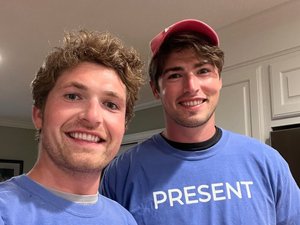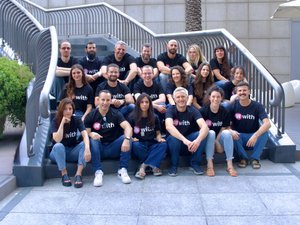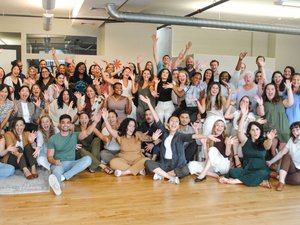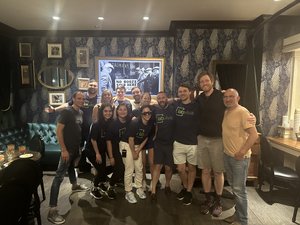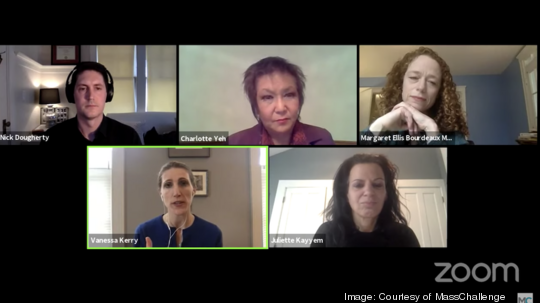
June Motherhood, a digital health startup offering a virtual doula service, had been working out of the Harvard i-lab space for just a few months when its founders were told to start packing their things to move out.
It was mid-March. Harvard University had just told its students not to come back after spring break, with the intention of transitioning all classes to remote learning by the end of the month. The same held true for the i-lab incubator. That week, i-lab leaders said that all its programming workshops and meetings would be held virtually, and team members could only come into the coworking space for "essential business purposes."
"Workshops are being offered virtually," Tina Beilinson, co-founder of June Motherhood, told BostInno. "We're scheduling appointments with lawyers and entrepreneurs and venture folks in residence virtually. [The i-lab is] keeping us updated on how some of those resources might be changing."
For Beilinson and her co-founders, all students at Harvard Business School, the transition is happening in tandem with the transition of their classes to online-only. Remote learning, remote working. Beilinson herself is staying at home in Cambridge, where she says she feels like she is still part of the Harvard community, even if she's not interfacing with people in person.
Leaders at Harvard i-lab are cultivating that feeling deliberately.
Matt Segneri, the i-lab's new executive director, said his team has scaled up one-on-one conversations and office hours in addition to the workshops that were already in place. Essentially everything is taking place over video conferencing and phone calls. It was a quick pivot for Segneri himself: His first day as executive director was March 9, the same week Harvard made the decision to go remote.
"The i-lab has always been more than a physical space," Segneri said. "The community transcends the campus."
A number of Harvard i-lab startups have begun working on initiatives specific to COVID-19, the respiratory illness caused by the novel coronavirus that's responsible for the shutdown. Some help individuals track their symptoms; another is making portable ventilators in response to nationwide shortages. Under Gov. Charlie Baker's recent order, any business working to address issues caused by the coronavirus are considered essential.
June Motherhood itself has pivoted. As a digital health platform, it has seen a huge uptick in demand for some of its telehealth services, Beilinson said. June recently held its first online childbirth education class and gave expecting parents whose in-person classes had been canceled a free session.
Beilinson and her team plan on expanding their suite of online offerings in the coming weeks, and even virtually, they've been able to rely on mentors and advisors through the i-lab as they do so.
"One of the things I've been really surprised by is how much these entrepreneurs in residence and other folks have stayed committed to the program," Beilinson said. "I haven't had any of my meetings canceled. It feels like these folks are even more eager to talk to and support us."
Harvard i-lab is just one of several Boston-area incubators and accelerators that have been forced to go entirely virtual mid-program. MassChallenge's HealthTech and FinTech accelerators are in the same boat, as are Techstars Boston and Greentown Labs. LearnLaunch's accelerator hasn't begun yet, but its leaders are already preparing to have at least the first few weeks online only.
For the people running these programs, it's been a challenge to foster the kinds of relationships that are typically developed in person entirely online. Zoom, Slack, Google Hangouts and more have begun to feature heavily in day-to-day life.
"For Techstars, the program is unique for each of the companies, which is why we only work with 10 companies at a time," said Clement Cazalot, managing director of Techstars Boston. "One-to-one and advisory board meetings are now fully remote. The bulk of the programming, founder dinners and KPI meetings—all that is fully on Zoom. We live and die by Zoom."
Devon Sherman, managing director of MassChallenge FinTech, echoed that sentiment. Her program made the call to go virtual in early March and has since held entire events virtually. There's a silver lining here, Sherman said, in that video conferences have a much higher capacity than in-person venues do, making space constraints a secondary concern. MassChallenge HealthTech recently held a COVID-19 Innovation Summit entirely over Zoom.
The same is true for Greentown Labs, the cleantech incubator based in Somerville. CEO Emily Reichert added that in addition to its use as a team communication tool, Slack has also become important for keeping the larger Greentown community together.
Greentown and Techstars have also become especially deliberate in choosing speakers. Reichert and Cazalot both said they've brought in mentors and panelists who have weathered other era-defining events, the 9/11 terrorist attacks, the dot-com boom and subsequent bust and the 2008 recession among them.
It's good timing. In a matter of weeks, the coronavirus has become a dire threat to the U.S. economy.
"We wanted our startups to be exposed to a panel of experts who had really been through it before," Reichert said. "A lot of the folks we're helping haven't been through a big recessionary period."
There are currently more than 100 startups based out of Greentown Labs, Reichert said. Given the nature of the program, some of those are considered essential businesses, including Biobot Analytics, which is building a platform to measure population health using wastewater data. Biobot has recently applied its methods to track the spread of COVID-19 through sewage.
In the meantime, other startups that rely on Greentown's lab space are in a bit of a holding pattern. Unless they are considered essential, they can only work remotely—which only goes so far for some companies.
In Techstars Boston, there are just 10 startups, all of them local to Boston for the first time in the accelerator's 11-year history. But now, location seems to matter less than ever.
Cazalot noted that overall, Techstars is relatively experienced in remote programming. Since 2017, Techstars has been running Techstars Anywhere, an entirely virtual accelerator designed to create opportunity for startups that don't have access to city-based programs.
"Any accelerator program that is trying to do business as usual, but doing it remotely, is probably going to fail. You need to rethink from the ground up," Cazalot said. "Being virtual, in the long term, I believe will bring more value to the companies. They will actually leverage more with the virtual community, and the alumni from other cities, versus in person, where you have only the view of Techstars Boston."
